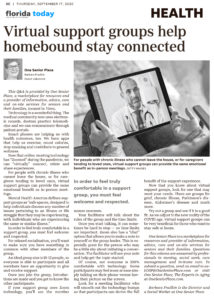
 Barbara Fradkin, One Senior Place – Special to FLORIDA TODAY
Barbara Fradkin, One Senior Place – Special to FLORIDA TODAY
This Q&A is provided by One Senior Place, a marketplace for resources and a provider of information, advice, care and on-site services for seniors and their families, located in Viera.
 Q: I belonged to a grief support group at my church, but it is no longer meeting because of the pandemic. What can I do now?
Q: I belonged to a grief support group at my church, but it is no longer meeting because of the pandemic. What can I do now?
A: Technology is a wonderful thing. The medical community now uses electronic records, doctors practice telemedicine and we can communicate through patient portals.
Smart phones are helping us with health outcomes, too. We have apps that help us exercise, count calories, stop smoking and contribute to general wellness.
Now that online meeting technology has “Zoomed” during the pandemic, we can “virtually” connect, relate and share experiences.
For people with chronic illness who cannot leave the house, or for caregivers tending to loved ones, virtual support groups can provide the same emotional benefit as in-person meetings.
Mental Health America defines support groups as “safe spaces, designed to help individuals discuss any number of issues pertaining to an illness or life struggle that they may be experiencing, with individuals who are experiencing the same or similar illness.”
In order to feel truly comfortable in a support group, you must feel welcome and respected.
For relaxed socialization, you’ll want to make sure you have something in common with other members of the group.
An ideal group size is 10-12 people, so everyone is able to participate and all members have an opportunity to give and receive support.
Once you join the group, introductions are made and you get to know the other participants.
If your support group uses Zoom technology, you’ll see the member names onscreen.
Your facilitator will talk about the rules of the group and the time limits.
Once you start talking, it can sometimes be hard to stop — so time limits are important. Zoom also has a “chat” option that allows you to make a note to yourself or the group leader. This is especially great for the person who may be a little shy about initiating a conversation. The facilitator will see your note and help get the topic started.
Of course, not everyone is 100% comfortable with technology. Some participants may feel more at ease simply talking on their phone versus having their picture on the screen.
Look for a meeting facilitator who will smooth out the technology bumps so that participants can derive the full benefit of the support experience.
Now that you know about virtual support groups, look for one that may meet your needs. There are groups for grief, chronic illness, Parkinson’s disease, Alzheimer’s disease and much more.
Try out a group and see if it is a good fit. As we adjust to the new reality of the COVID age, virtual support groups can be very beneficial for those who want to stay safe at home.
# # #
One Senior Place is a marketplace for resources and a provider of information, advice, care and on-site services for seniors and their families. Questions for this column are answered by professionals in nursing, social work, care management and in-home care. To submit a question, send an email to askOSP@OneSeniorPlace.com or visit One Senior Place, The Experts in Aging at OneSeniorPlace.com.
Barbara Fradkin is the Director and a Social Worker at One Senior Place in Viera.


